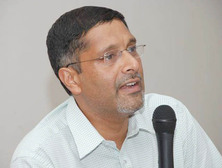
NEW DELHI - U.S.-based economist Arvind Subramanian is poised to be named as chief economic adviser to Prime Minister Narendra Modi’s government, two sources at the finance ministry said on Aug. 22. If confirmed, the appointment would bring a second economist of international renown to a key policy post following the naming of former International Monetary Fund chief economist Raghuram Rajan as...

Reserve Bank of India chief last year. Subramanian, a senior fellow at the Peterson Institute for International Economics, was recommended to the post by Finance Minister Arun Jaitley. Cabinet-level approval is expected to follow. “He is likely to be appointed soon,” one of the sources said.
Subramanian was educated in India and Britain and went on to serve at the IMF and at the forerunner to the World Trade Organization, before taking senior academic posts at Harvard and Johns Hopkins universities in the United States.
Recently, he criticized the Indian government’s decision to derail a WTO deal struck last year to streamline trade procedures by tying it to a separate controversy over food subsidies. “Yes, supporting agriculture is valid, but no, the tactic may be less so,” Subramanian wrote in a commentary at the end of July. He also criticized Jaitley’s maiden budget for being too optimistic in its revenue forecasts, saying it had failed to come clean on its fiscal accounting, and that it lacked timelines for passing crucial tax and subsidy reforms. If confirmed for a three-year term, Subramanian would be Jaitley’s top adviser - a position vacant since Rajan moved to the Reserve Bank of India last fall and started a shift to a more modern, Western-style policy of inflation targeting.
He would be responsible for producing the annual Economic Survey - a document on the state of economy that underpins the drafting of the budget - and a mid-year economic update that is presented to parliament. (Reuters)
Subramanian was educated in India and Britain and went on to serve at the IMF and at the forerunner to the World Trade Organization, before taking senior academic posts at Harvard and Johns Hopkins universities in the United States.
Recently, he criticized the Indian government’s decision to derail a WTO deal struck last year to streamline trade procedures by tying it to a separate controversy over food subsidies. “Yes, supporting agriculture is valid, but no, the tactic may be less so,” Subramanian wrote in a commentary at the end of July. He also criticized Jaitley’s maiden budget for being too optimistic in its revenue forecasts, saying it had failed to come clean on its fiscal accounting, and that it lacked timelines for passing crucial tax and subsidy reforms. If confirmed for a three-year term, Subramanian would be Jaitley’s top adviser - a position vacant since Rajan moved to the Reserve Bank of India last fall and started a shift to a more modern, Western-style policy of inflation targeting.
He would be responsible for producing the annual Economic Survey - a document on the state of economy that underpins the drafting of the budget - and a mid-year economic update that is presented to parliament. (Reuters)

 RSS Feed
RSS Feed
